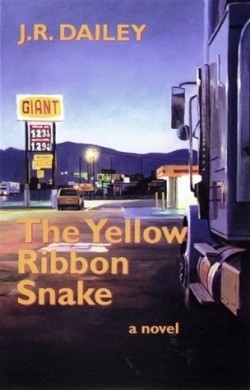The Yellow Ribbon Snake
What is left in the world for people who are still alive yet
whose lives have been destroyed? All is inverted. Pain is now painless. Poverty
is ambiguous riches. The hurtful past is now the ambivalent present.
Dailey writes with the metaphoric passion of Hawthorne and the real-life
matter-of-fact edge of Louise Erdrich. Her first novel’s setting is a truck
stop-desert highway Arizona where Jacko Lee, a “mentally” discharged Vietnam
veteran, lives out of a dumpster. Lee is a character in a book of ghosts where
his sister-in-law says, “The past, present and future blend together into a
soft nickering.”
The only softness of the novel is an eyelid found in a can of corned beef and
the binding material that gives the book its title. Wrapped tightly around
Jacko’s wrists as a sex abused child and, later, his mind, as a western hobo
wandering aimlessly through the lost days of his own mind and hometown, the
yellow ribbon snake is a rope-sized tapestry of doom. Jacko’s friends are
drifters and the dead, including his grandmother and the people he has
apparently murdered.
Dailey writes with a careful objectivity, teasing the reader with a combination
of peace earned in midlife and a criminally charged infestation of madness that
parallels the Furies of ancient literature. “Have you ever seen someone die?
It’s not like in the movies,” says Marie, the novel’s only other narrator.
“They don’t die instantly, they struggle and flop, every bit of their energy
goes into not dying. And the man’s last words aren’t anything noble. He says,
‘Oh shit,’ because of the terrible unfairness of losing one’s life to another
man’s whim.” The author bridges this disturbing commentary with a Mexican
dinner at a villa that is so well presented you can just about taste the chili
burritos and feel the warmth of a prairie home.
All the past’s voices converge in this novel with the sights and sounds of the
inspired failure of the goldrush dream turned strip bar-gas station hell of
today’s midwest. It’s indeed possible to wonder at the close of this little
book if we are in the presence of our own worst philosophical fears of man’s
inhumanity to man, or if we are getting just another (too close) view of the
garbage at the side of the I-10 highway. Either way, Dailey commands serious
attention.
Reviewed by
Brandon M. Stickney
Disclosure: This article is not an endorsement, but a review. The publisher of this book provided free copies of the book to have their book reviewed by a professional reviewer. No fee was paid by the publisher for this review. Foreword Reviews only recommends books that we love. Foreword Magazine, Inc. is disclosing this in accordance with the Federal Trade Commission’s 16 CFR, Part 255.

